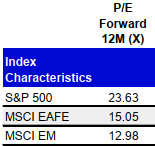
Indiana Trust Wealth Management
Investment Advisory Services
by Clayton T. Bill, CFA
Vice President, Director of Investment Advisory Services
- The U.S. equity market, represented by the S&P 500 index, fell 4% for the week.
- Stock markets outside the US provide potential diversification benefits should US stocks have trouble meeting their lofty earnings growth expectations.
US large-cap stocks have dominated global equity market returns for several years. There is a fundamental reason for the outperformance: big US corporations have been able to grow earnings at a more rapid pace than foreign multinationals.
Another reason the US large-cap market has outperformed is that it has become more “expensive” relative to earnings when judged by its price-to-earnings (P/E) ratio. In investor-parlance, US large-cap multiples have expanded. Foreign stocks’ multiples, on the other hand, have decidedly not expanded, remaining “cheap”.
This is illuminated in the chart below, comparing the forward-looking P/E for the S&P 500 versus foreign developed markets (MSCI EAFE) and emerging markets stocks (MSCI EM):

Source: Invesco, August 30, 2024
The S&P 500’s P/E ratio is almost double that of emerging markets and stands 70% higher than developed markets. This could make sense, as we have noted recently, should US companies continue to grow earnings rapidly in the coming years relative to foreign company earnings growth. Foreign markets may indeed be relatively “cheap for a reason”.
However, the yawning valuation disparity and those strong earnings growth expectations for US stocks provide good rationales for meaningful allocations to foreign markets. US stocks have a high earnings growth bar to meet to justify such a P/E ratio. Even if earnings growth is decent, US stocks may face a re-rating to a lower multiple. (That is jargon for “lackluster returns”.) The bar is relatively lower for stocks outside the US.
Another rationale for foreign stock market allocations is to gain exposure to a modest level of currency diversification. Overall, the dollar has been on a long winning streak versus major currencies such as the euro and pound sterling. Foreign currency weakness depresses foreign stock market returns for US investors. This can be fickle, however, as currency markets are notoriously difficult to predict. It is reasonable to assume that a bit of non-dollar exposure could help US investors in the future.
__________
IMPORTANT DISCLOSURES: All info contained herein is solely for general informational purposes. It does not take into account all the circumstances of each investor and is not to be construed as legal, accounting, investment, or other professional advice. The author(s) and publisher, accordingly, assume no liability whatsoever in connection with the use of this material or action taken in reliance thereon. All reasonable efforts have been made to ensure this material is correct at the time of publication. Copyright Indiana Trust Wealth Management 2024.
